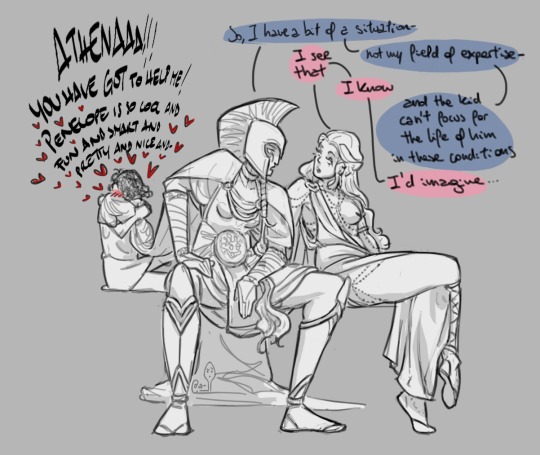너�� 스타로 본다 너무 밝게 빛나서 우리 삶을 온전히 밝혀주는 𓂃 ִֶָ 𝐁𝐓𝐒 ꨄ (𝐺)𝐼-𝐷𝐿𝐸 爱
Don't wanna be here? Send us removal request.
Text

silly little sketch of athena dealing with a young lovestruck odysseus
6K notes
·
View notes
Text
NOTICE: As more and more fanfic writers are using generative AI for their works (you uncreative dweebs), I hereby swear on everything I hold dear that I have not and will NEVER use generative AI in ANY of my written work. Everything I post will be organically and creatively my own.
56K notes
·
View notes
Text
wikipedia no longer being anywhere near the top of search results when looking up anything feels eviscerating
115K notes
·
View notes
Text
what do you mean i have to go to work today. when i just did it yesterday???
55K notes
·
View notes
Text
I feel like whenever Sizhui is doing something WWX didn’t appreciate, he would always play out some variation of “do you know how long I was in labor with you? 9 hours of agony only for this!”
Every time someone tries to go like “that’s literally impossible” the Hanguang-doesn’t tell lies-jun is there saying “no I was there. I watched it happen. I held his hand through it”
775 notes
·
View notes
Text

PSA: never discuss private affairs in your DMs, especially contraception and abortion. Social media moguls will absolutely sell you out to the government. There are already cases of people being charged based on evidence in their DMs.
79K notes
·
View notes
Text
Growing up is actually all about realizing people don’t inherently dislike you and it’s a bit odd to assume they do
300K notes
·
View notes
Text
thinking about telemachus recently and how odysseus was gone for like. his entire life. strictly speaking, telemachus wasn't the child of a single parent but he may as well have been. do you think that showed through, when odysseus did finally return home?
certainly, he was always a mama's boy. no one doubted that. he had no one else, after all. there was laertes, and the men around the palace (who harbored a disgust for the horde of suitors that almost rivalled penelope's) and he loved them all dearly, but it was not the same. telemachus grew up loving his mother with all of his heart, and defending her with all his strength.
and then this man comes home, and he has telemachus' smile and he knows things that only telemachus' father would know, but he is a stranger. odysseus arrives home as a creature of myth, the misty stuff of fables that you could almost touch if you reached, but never quite grasp. telemachus does not know this man, but seeing him that day in the throne room is the first time in twenty years that penelope has shed tears of joy instead of pain, so he decides there must be something to him. he smiles at this man's jokes and listens raptly to his stories (and he does have so many stories!) but there is always that distance there. a gap in the planks of the bridge, a crevasse that's just too wide to jump across. he tries to know him, but it is not as easy as either of them would like it to be.
it is penelope that finally bridges the gap. telemachus finds her in tears again one day, tucked away somewhere odysseus would not see, and he rushes to his mother's side, but when he reaches her she cups his face the way she did when he was a boy. her hands are thinner now than they were then, and there are lines on her face that had not been there before, but behind the glimmer of tears is that spark. that strong, intelligent spark that first drew odysseus to her; that spark that convinced young telemachus that his mother could rival athena in wisdom if she wished to be so bold.
but these tears, he finds, are not the ones he expected. as penelope takes her son into her arms she whispers, you're just like him. you're so much like your father, and i am so proud.
and that sticks.
telemachus meets the stranger with his father's face and thinks, he's just like me. he watches him laugh the way he himself does, he compares his face and odysseus' in a mirror and the similarities make him smile this time. he hears others in the palace tell of the king's courage and his wit and he thinks, perhaps i can be like him. perhaps he is like me.
telemachus greets odysseus that night and calls him father, and for the first time, the word does not feel strange on his tongue.
it feels right.
2K notes
·
View notes
Text
thinking about telemachus recently and how odysseus was gone for like. his entire life. strictly speaking, telemachus wasn't the child of a single parent but he may as well have been. do you think that showed through, when odysseus did finally return home?
certainly, he was always a mama's boy. no one doubted that. he had no one else, after all. there was laertes, and the men around the palace (who harbored a disgust for the horde of suitors that almost rivalled penelope's) and he loved them all dearly, but it was not the same. telemachus grew up loving his mother with all of his heart, and defending her with all his strength.
and then this man comes home, and he has telemachus' smile and he knows things that only telemachus' father would know, but he is a stranger. odysseus arrives home as a creature of myth, the misty stuff of fables that you could almost touch if you reached, but never quite grasp. telemachus does not know this man, but seeing him that day in the throne room is the first time in twenty years that penelope has shed tears of joy instead of pain, so he decides there must be something to him. he smiles at this man's jokes and listens raptly to his stories (and he does have so many stories!) but there is always that distance there. a gap in the planks of the bridge, a crevasse that's just too wide to jump across. he tries to know him, but it is not as easy as either of them would like it to be.
it is penelope that finally bridges the gap. telemachus finds her in tears again one day, tucked away somewhere odysseus would not see, and he rushes to his mother's side, but when he reaches her she cups his face the way she did when he was a boy. her hands are thinner now than they were then, and there are lines on her face that had not been there before, but behind the glimmer of tears is that spark. that strong, intelligent spark that first drew odysseus to her; that spark that convinced young telemachus that his mother could rival athena in wisdom if she wished to be so bold.
but these tears, he finds, are not the ones he expected. as penelope takes her son into her arms she whispers, you're just like him. you're so much like your father, and i am so proud.
and that sticks.
telemachus meets the stranger with his father's face and thinks, he's just like me. he watches him laugh the way he himself does, he compares his face and odysseus' in a mirror and the similarities make him smile this time. he hears others in the palace tell of the king's courage and his wit and he thinks, perhaps i can be like him. perhaps he is like me.
telemachus greets odysseus that night and calls him father, and for the first time, the word does not feel strange on his tongue.
it feels right.
2K notes
·
View notes
Text
Still thinking about EPIC because I just love how EPIC handles Ody’s guilt.
Now, I don’t think I need to deep dive on how Odysseus’ guilt drives him in Act I. We’ve been obsessing over that for ages lmao, but very briefly: He feels awful for killing the infant Astyanax, and tries to force Polites’ “Open Arms” philosophy in order to ease that guilt.
Then, in “Monster,” Odysseus grapples with how his guilt leads him to make mistakes, asking: “What if I’m the one who killed you / every time I caved to guilt?”
And the implication is that gives up his guilt, deciding he needed to be a monster who “threw that guilt away.” And yet.
He never does.
He never stops feeling guilty—not about what he does in Act I, and not about what he does in Act II. We see it in how he agonizes over Zeus’ impossible choice in “Thunder Bringer”; in “Love in Paradise” when he’s haunted by the ghosts of his loved ones. And it’s not like he’s unaware of what he’s doing—Odysseus knows he’s been trying to suppress his feelings, most of all guilt and remorse.
In “Six Hundred Strike,” Poseidon rhetorically asks “How will you sleep at night?” He wants to know how Odysseus is going to live with his guilt, if he even still feels guilt. Odysseus answers his rhetorical question literally, “Next to my wife.”
Which, not only is that just a raw line, but it also does give a rhetorical answer. Odysseus knows that he isn’t going to be okay, that the guilt will way him up inside for the rest of his days, but he also knows he can count on Penelope. That she will help him shoulder his burden.
And he’s prove right in “Would You Fall in Love with Me Again.”
Because, finally. After twenty years, Odysseus is home, safe and sound—and all at once the guilt hits him. The pain and regret over every decision he had to make comes crashing down the moment he no longer had to suppress it.
And he hates it; he hates himself for making those choices, even when there was no other way to get home.
So he tries to dehumanize himself once more—to convince Penelope and himself that he’s become some kind of remorseless monster. Because that’s how he coped with it last time. That’s how he survived “Monster.”
And Penelope sees right through his bullshit. She cuts through his guilt and self-loathing to tell him, in no uncertain terms, that he is still human; that he is loved. And in doing so, tells him that it’s okay to grieve, to feel that guilt and let it go. He’s suffered enough.
878 notes
·
View notes
Text

“Would fall in love with me again if you knew all I’ve done?”
24K notes
·
View notes
Text

Day 13 of Sirentober / Doctober
Epic / Love
They make me ill
Available as a print on my Etsy Shop
4K notes
·
View notes
Text
rough animatic. crawling back to you
11K notes
·
View notes
Text

hey i'm still not over the ithaca saga :_) 🏹
5K notes
·
View notes


